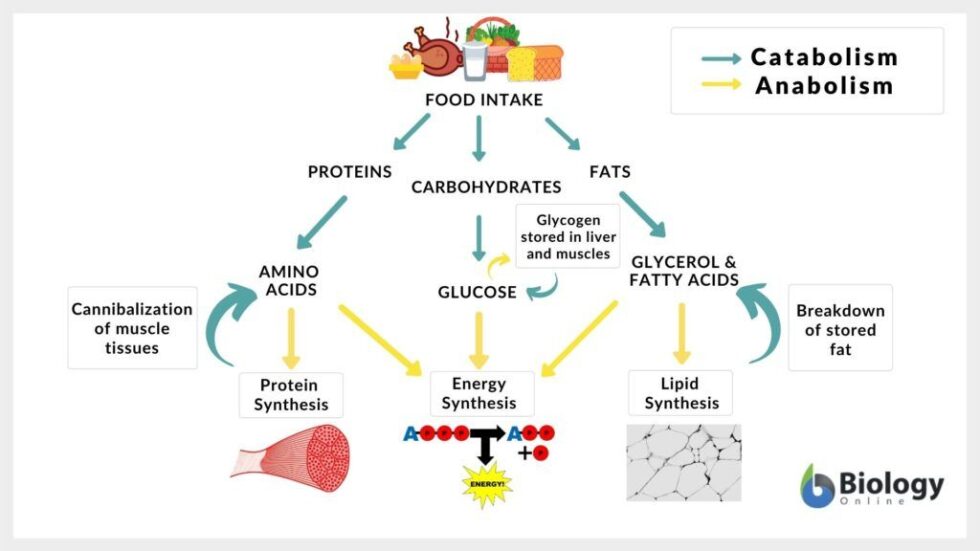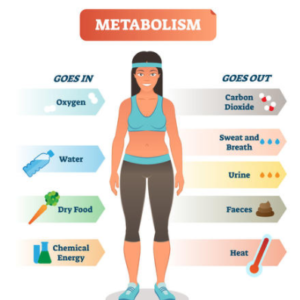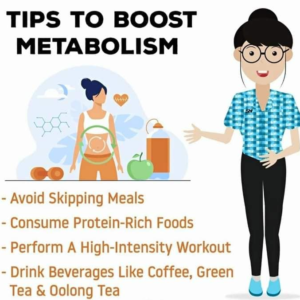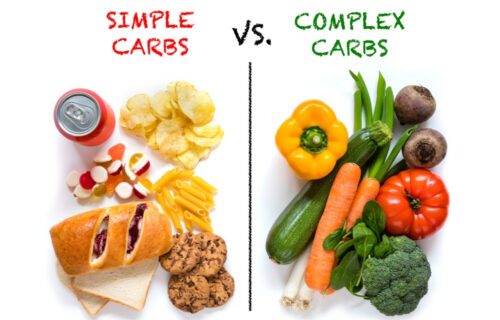
How much does a slow metabolism affect weight gain?
I hear it all the time – people saying they keep gaining weight no matter how little you eat because you have a slow metabolism or blame their ‘glands’ or their genes.
There is a lot of misunderstanding about the impact metabolism has on our health, especially in terms of weight loss.
Metabolism refers to the countless chemical processes going on continuously inside the body that allow life and normal functioning.
- The amount of kilojoules your body burns at any given time is affected by your metabolism.
- Your metabolic rate is influenced by many factors – including age, gender, muscle-to-fat ratio, amount of physical activity and hormone function
- Achieving or maintaining a healthy weight is a balancing act. If we regularly eat and drink more kilojoules than we need for our metabolism, we store it mostly as fat.
- Most of the energy we use each day is used to keep all the systems in our body functioning properly. This is out of our control. However, we can make metabolism work for us when we exercise. When you are active, the body burns more energy (kilojoules).
Metabolic rate
Your body’s metabolic rate (or total energy expenditure) can be divided into three components, which are:
- Basal metabolic rate (BMR) – even at rest, the body needs energy (kilojoules) to keep all its systems functioning correctly and accounts for 50–80% of your daily energy use.
- Thermic effect of food (also known as thermogenesis) – your body uses energy to digest the foods and drinks you consume and accounts for about 5–10%.
- Energy used during physical activity – this is the energy used by physical movement and it varies the most depending on how much energy you use each day. Based on a moderately active person (30–45 minutes of moderate-intensity physical activity per day), this component contributes 20% of our daily energy use.

Metabolism and age-related weight gain
Muscle tissue has a large appetite for kilojoules. The more muscle mass you have, the more kilojoules you will burn.
People tend to put on fat as they age, partly because the body slowly loses muscle. It is not clear whether muscle loss is a result of the ageing process or because many people are less active as they age. However, it probably has more to do with becoming less active. Research has shown that strength and resistance training can reduce or prevent this muscle loss.
Hormonal disorders of metabolism
Hormones help regulate our metabolism. Some of the more common hormonal disorders affect the thyroid. This gland secretes hormones to regulate many metabolic processes, including energy expenditure (the rate at which kilojoules are burned).
Thyroid disorders include:
- Hypothyroidism (underactive thyroid) – the metabolism slows because the thyroid gland does not release enough hormones. A common cause is the autoimmune condition Hashimoto’s disease. Some of the symptoms of hypothyroidism include unusual weight gain, lethargy, depression and constipation.
- Hyperthyroidism (overactive thyroid) – the gland releases larger quantities of hormones than necessary and speeds the metabolism. The most common cause of this condition is Graves’ disease. Some of the symptoms of hyperthyroidism include increased appetite, weight loss, nervousness and diarrhoea.
In simple terms, metabolism is the internal process by which our body expends energy and burns calories. It runs 24/7, even when we’re resting or sleeping, by converting the food and nutrients we consume into the energy our body needs in order to breathe, circulate blood, grow and repair cells, and everything else it does to survive.
This process works at different intensities in different people. How fast your metabolism works is determined mostly by your genes. People might have fast, slow, or average metabolism, regardless of their body size and composition. Age also affects metabolism, as it can slow over the years, even if a person starts out with a fast metabolism. Differences in metabolism speed are evident in how easy or hard it is for people to gain or lose weight. A slow metabolism burns fewer calories, which means more get stored as fat in the body. That’s why some people have difficulty losing weight by just cutting calories. A fast metabolism burns calories at a quicker rate, which explains why some people can eat a lot and not gain extra kgs.
But you can’t entirely blame a sluggish metabolism for gaining weight. The reality is that metabolism often plays a minor role. The factors that always will matter the most are diet quality, total daily calorie intake and level of activity.
While it may only be a small change, a person can speed up a naturally slow metabolism, or rev up one that has become sluggish over time.
Here are ten factors that affect BMR and metabolism:
1. Muscle mass. The amount of muscle tissue on your body. Muscle requires more energy to function than fat. So the more muscle tissue you carry, the more energy your body needs just to exist. (Resistance or strength training is most effective for building and maintaining mass.)
2. Age. As you get older, your metabolic rate generally slows. This is because of a loss of muscle tissue and changes to hormonal and neurological processes. During development children go through periods of growth with extreme rates of metabolism.
3. Body size. Those with bigger bodies have a larger BMR because they have larger organs and fluid volume to maintain.
4. Gender. Men generally have faster metabolisms than women.
5. Genetics. Some families have faster BMR than others with some genetic disorders also affecting metabolism.
6. Physical activity. Exercise increases muscle mass and powers up your metabolic engines burning kilojoules at a faster rate, even when at rest.
7. Hormonal factors. Hormonal imbalances such as hypo & hyperthyroidism can affect your metabolism.
8. Environmental factors. Environmental changes such as increased heat or cold forces the body to work harder to maintain its normal temperature and increases BMR.
9. Drugs. Caffeine and nicotine can increase your BMR whilst medications such as antidepressants and steroids increase weight gain regardless of what you eat.
10. Diet. Food changes your metabolism. What and how you eat has a big influence on your BMR.
This list shows us that some things you can change to alter your BMR and some things you can’t. The good news is that you can do plenty to alter the balance.

There is also another issue to be aware of – Metabolic syndrome is a cluster of risk factors and can increase your risk of heart disease, kidney disease and diabetes, including:
- high blood pressure
- insulin resistance
- excess abdominal weight
- high triglycerides (a type of fat) in the blood
- low levels of ‘healthy’ blood cholesterol (HDL)
References:



